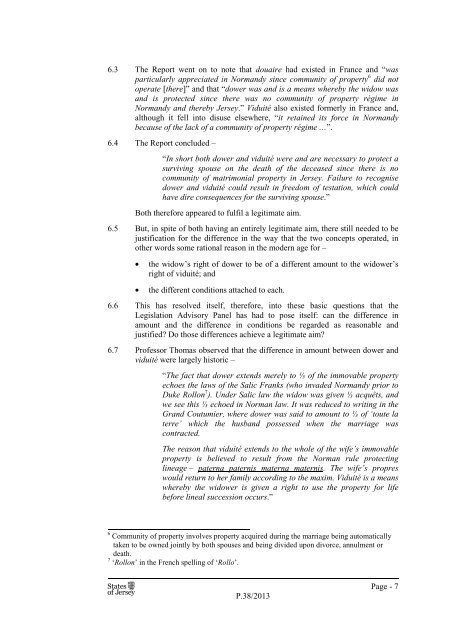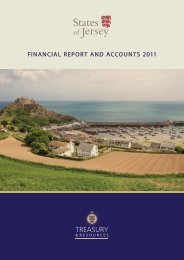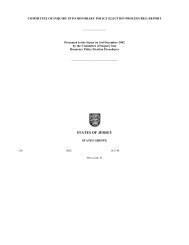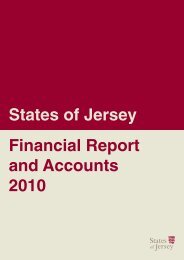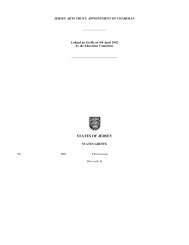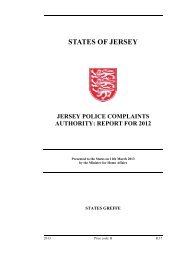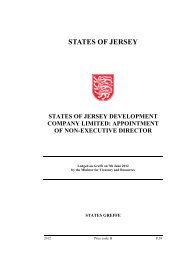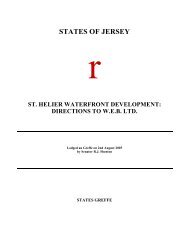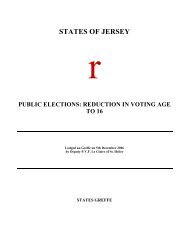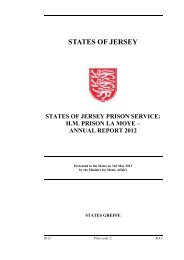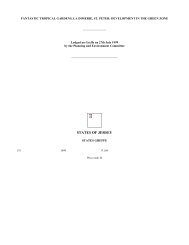Draft Wills and Successions (Amendment No. 2 ... - States Assembly
Draft Wills and Successions (Amendment No. 2 ... - States Assembly
Draft Wills and Successions (Amendment No. 2 ... - States Assembly
Create successful ePaper yourself
Turn your PDF publications into a flip-book with our unique Google optimized e-Paper software.
6.3 The Report went on to note that douaire had existed in France <strong>and</strong> “wasparticularly appreciated in <strong>No</strong>rm<strong>and</strong>y since community of property 6 did notoperate [there]” <strong>and</strong> that “dower was <strong>and</strong> is a means whereby the widow was<strong>and</strong> is protected since there was no community of property régime in<strong>No</strong>rm<strong>and</strong>y <strong>and</strong> thereby Jersey.” Viduité also existed formerly in France <strong>and</strong>,although it fell into disuse elsewhere, “it retained its force in <strong>No</strong>rm<strong>and</strong>ybecause of the lack of a community of property régime …”.6.4 The Report concluded –“In short both dower <strong>and</strong> viduité were <strong>and</strong> are necessary to protect asurviving spouse on the death of the deceased since there is nocommunity of matrimonial property in Jersey. Failure to recognisedower <strong>and</strong> viduité could result in freedom of testation, which couldhave dire consequences for the surviving spouse.”Both therefore appeared to fulfil a legitimate aim.6.5 But, in spite of both having an entirely legitimate aim, there still needed to bejustification for the difference in the way that the two concepts operated, inother words some rational reason in the modern age for –• the widow’s right of dower to be of a different amount to the widower’sright of viduité; <strong>and</strong>• the different conditions attached to each.6.6 This has resolved itself, therefore, into these basic questions that theLegislation Advisory Panel has had to pose itself: can the difference inamount <strong>and</strong> the difference in conditions be regarded as reasonable <strong>and</strong>justified? Do those differences achieve a legitimate aim?6.7 Professor Thomas observed that the difference in amount between dower <strong>and</strong>viduité were largely historic –“The fact that dower extends merely to ⅓ of the immovable propertyechoes the laws of the Salic Franks (who invaded <strong>No</strong>rm<strong>and</strong>y prior toDuke Rollon 7 ). Under Salic law the widow was given ⅓ acquêts, <strong>and</strong>we see this ⅓ echoed in <strong>No</strong>rman law. It was reduced to writing in theGr<strong>and</strong> Coutumier, where dower was said to amount to ⅓ of ‘toute laterre’ which the husb<strong>and</strong> possessed when the marriage wascontracted.The reason that viduité extends to the whole of the wife’s immovableproperty is believed to result from the <strong>No</strong>rman rule protectinglineage – paterna paternis materna maternis. The wife’s propreswould return to her family according to the maxim. Viduité is a meanswhereby the widower is given a right to use the property for lifebefore lineal succession occurs.”6 Community of property involves property acquired during the marriage being automaticallytaken to be owned jointly by both spouses <strong>and</strong> being divided upon divorce, annulment ordeath.7 ‘Rollon’ in the French spelling of ‘Rollo’.◊Page - 7P.38/2013


